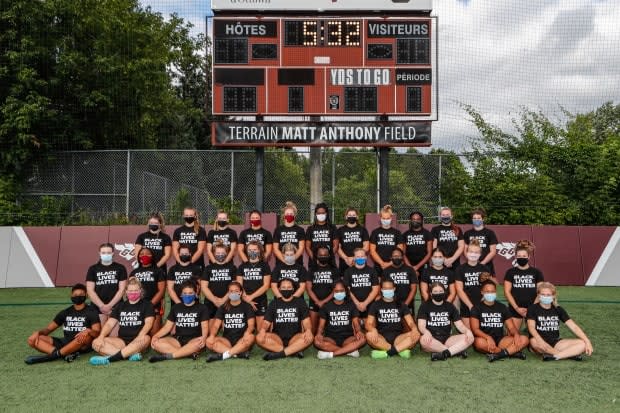U of O athletes form an advocacy council to address BIPOC issues

Student athletes at the University of Ottawa formed a new group to address BIPOC representation and equity issues in the athletics department.
The Black Student-Athletes Advocacy Council (BSAAC) was started last September by two members of the women's rugby team, but membership has now extended to involve 10 other athletes from various teams.
"I'm hoping to modify policies at the university, hiring practices [and] possible scholarships for black athletes. But it also is just about Black athletes having a form of leadership in university athletics that was not seen before," said Kennedy Banton-Lindsay, one of the founding members.
She said the group is open to all races.
"There is a diversity issue with the staff at our university— the lack of Black head coaches and Black coaches and Black sports service employees."
N-word impact
The council was born out of the Black Lives Matter movement and to address recent events surrounding race at the university, including the debate around the use of the N-word in classrooms.
"I would say it played a big role for me as a rookie," Banton-Lindsay said of the controversy. "Instead of just kind of taking [it] as a defeat, I decided to try and make change."
The council has already been involved in discussions with administration about their concerns. Just prior to the holiday break, it was invited to meet with the university's administration committee to share its concerns about racism on campus. And in February, members met with the co-chairs of the university's action committee on anti-racism and inclusion.
"The Black community and BIPOC community on the university campus feels like there should be more respect toward them in general," said Yvan Mongo, who also on the new council and is captain of the men's hockey team.

Starting to make changes
He said he hasn't experienced any racism at the school, and although he generally felt included playing hockey while growing up, there were still difficult times.
"I've been called the N-word on the ice, which was really, really tough," Mongo said. "I just feel as though sometimes I had a treatment that was different from other players and I couldn't explain why."
When the N-word debate blew up at the school, he wanted to make a difference.
"As a group, we felt like it wasn't about academic freedom at all. It was more a matter of respect … people fight so hard to keep using that word was kind of disturbing," he said
"I just wish we could create an environment that is safe and enjoyable for everyone."
The group has already started to make changes. Following meetings with the group, the Varsity Athletics department is now providing mandatory anti-racism training as part of the annual student-athlete orientation.
A working group made up of BSAAC representatives, coaches and administrators are working on an action plan to be presented to the university's senior administration in the spring.

